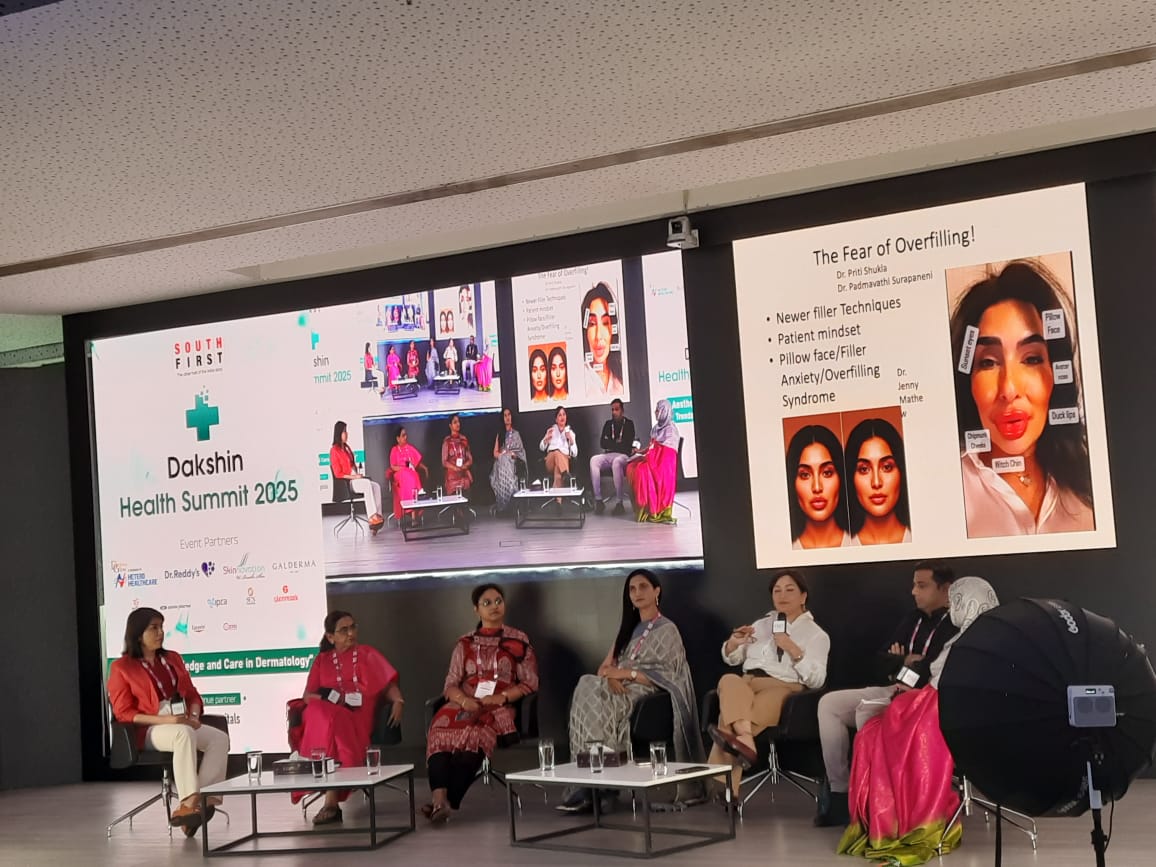Published Nov 09, 2025 | 3:53 PM ⚊ Updated Nov 12, 2025 | 7:00 PM

Dakshin Health Summit 2025
Synopsis: At Dakshin Health Summit’s aesthetic dermatology session, experts discussed shift to holistic, non-invasive treatments, AI’s role in simulations, and ethical concerns. Panelists urged natural results, patient education, and caution against social media ideals, emphasising “do no harm” over profit-driven practices.
The second edition of South First‘s Dakshin Health Summit, held at the Asian Institute of Gastroenterology (AIG), Gachibowli, Hyderabad, featured a deeply engaging session on “Aesthetic Dermatology: Trends and Transformations.”
The discussion brought together some of the country’s most respected voices in dermatology and cosmetic medicine, exploring the evolution of aesthetic practices, the influence of artificial intelligence, and the growing importance of ethical, holistic approaches to skin and body care.

The second edition of the Dakshin Health Summit 2025 was held at the Asian Institute of Gastroenterology in Hyderabad on Sunday, 9 November.
The session was moderated by Dr Nazia Nousheen Siddiqua, Civil Surgeon Specialist and Dermatologist. The distinguished panel included Dr Maya Vedamurthy, Senior Dermatologist from Chennai; Dr Sharon Baisil, Epidemiologist and AI Expert in Public Health; Dr Padmavathi Surapaneni, Senior Dermatologist; Dr P Ashwini, Senior Dermatologist at AIG Hospitals; Dr Jenny Mathew, Clinical and Cosmetic Dermatologist; and Dr Priti Shukla, Cosmetic Plastic Surgeon.
Opening the discussion, Dr Maya Vedamurthy reflected on how aesthetic dermatology has evolved over the years, moving away from purely facial-focused treatments to more comprehensive body wellness.
According to her, “The trend is clearly shifting from invasive procedures to minimally invasive and non-invasive treatments. Earlier, cosmetic procedures were limited mostly to the face, but now the focus has expanded to the entire body. People are increasingly concerned about their skin, hair, body fat, and overall well-being.”
She added that this shift represents a larger movement towards holistic wellness rather than isolated cosmetic correction.
“It’s not just about how the skin looks anymore, it’s about feeling healthy and confident in one’s entire body,” she noted.
Dr Priti Shukla added that this change in patient mindset has also influenced how cosmetic surgeons approach weight management.
“Rather than using liposuction or other surgical fat reduction methods for quick results, many people are now opting for more sustainable ways — including diet, exercise, or injectable treatments,” she said. “It’s encouraging to see this awareness growing.”
Dr Padmavathi Surapaneni elaborated on the science of skin health, identifying four key pillars that define healthy skin: Tone, texture, hydration, and firmness. According to her, modern skincare has moved beyond the pursuit of fairness.
“People are no longer asking for fair skin — they want even-toned, radiant skin,” she said. “Hydration, both internal and external, is key to maintaining skin vitality. Treatments today are customised to each person’s needs, aiming to enhance their natural beauty rather than alter their appearance.”
She emphasised that newer filler techniques are evolving rapidly, and the principle of “less is more” is now guiding aesthetic practice.
“Underfilling is safer and more natural, especially since hyaluronic acid-based fillers continue to improve results over time,” Dr Padmavathi said.
“Fillers should correct age-related changes and bring back harmony to the face, not create an artificial look. Nobody should feel that something has been ‘done’.”
Dr Maya also spoke about addressing misconceptions surrounding Botox. She explained that describing Botox as a protein helps patients feel more comfortable.
“Many people think Botox paralyses muscles or creates a frozen expression,” she said. “But in reality, it simply softens features. I often use what I call ‘baby Botox’— a half-dose approach that gives subtle results and allows patients to decide if they want more.”
Technology and artificial intelligence are redefining aesthetic dermatology. Dr Sharon Baisil, who works at the intersection of AI and public health, highlighted how emerging AI tools are transforming the way dermatologists plan and visualise treatments.
“With AI-based tools, we can now show patients real-time simulations of how their treatment will look — for instance, the effect of a filler or laser in specific areas,” he explained.
He compared these new AI tools to earlier high-end facial scanners that cost around ₹12 lakh, along with annual software charges of a similar amount.
“Now, a European company has released an AI tool that costs only around ₹5,000/year. It uses a simple mobile photo — even from an iPhone — and performs a highly accurate analysis,” he said.
“Although not as precise as a premium scanner, the AI has been trained on millions of patient images, offering remarkable accuracy at a fraction of the cost.”
Dr Sharon also cautioned that while AI improves accessibility, it simultaneously fuels unrealistic beauty ideals. “Social media filters and AI-driven beauty apps have completely changed how people, especially the younger generation, view themselves,” he said.
“In South Korea, for instance, the obsession with V-shaped faces, ‘glass skin,’ and fair complexions has created a toxic beauty culture. Sadly, many of our youth are now imitating this blindly, driven by influencers and online trends.”
She added that such pressures often lead young people to seek cosmetic procedures prematurely. “When real-life appearances don’t match filtered images, it can cause anxiety, self-doubt, or even depression,” he said.
“To bridge that gap, teenagers are turning to cosmetic clinics far too early. As professionals, we must guide them responsibly and set healthy expectations.”
Echoing caution, Dr Maya Vedamurthy shared a personal experience where a patient presented an AI-generated facial map suggesting filler injections across almost the entire face. “The AI’s recommendations were nearly double the safe dosage, and it even marked areas like the forehead — where I never use fillers,” she recounted.
“That’s when I explained to the patient that AI can assist but should never replace medical expertise. AI lacks the clinical judgment and aesthetic understanding of a trained professional.”
The panel also explored the social and ethical dimensions of aesthetic dermatology. Dr Jenny Mathew raised concerns about the growing obsession with fairness among adolescents, calling it a “real social menace”
Especially in the South, many young people grow up thinking fair skin equals beauty or success,” she said. “Fairness creams are often used by entire groups of schoolgirls, and when they stop, their skin tone returns to normal, which they find difficult to accept. It becomes an emotional dependency that requires counselling, not just dermatological care.”
Dr Padmavathi Surapaneni added that holistic skincare now means addressing multiple concerns at once through combination treatments.
“By integrating lasers, injectables, and peels, we can treat different skin layers and conditions simultaneously,” she said. “Each patient needs a personalised protocol. The goal is to achieve balanced, long-lasting, and natural results.”
Dr Maya Vedamurthy pointed out that ethical practice and patient education are vital in this evolving field.
“A proper combination of nutraceuticals for internal care and cosmeceuticals for external care is key,” she said. “But we must ensure informed consent and responsible use of technology in every case.”
Dr Priti Shukla concluded that the field must remain patient-centred rather than profit-driven. “Non-medical practitioners using unapproved devices should be penalised,” she said. “Doctors must act as trusted advisors — guiding patients scientifically, explaining risks, and avoiding commercial pressure.”
The collective message from the panel was clear — while aesthetic dermatology is rapidly advancing with AI, lasers, and non-invasive technologies, ethics and empathy must always guide the practice.
The experts agreed that the future of dermatology lies in integrating science with responsibility, ensuring safety, personalisation, and emotional well-being.
The key takeaway from the session was to practice aesthetic medicine with conscience, select appropriate devices, educate patients, use AI wisely and ethically, and remember the fundamental principle — “do no harm.”
As Dr Sharon Baisil summarised, “AI is a great tool for learning and visualisation, but it must never replace human expertise. Use technology to empower, not to exploit.”
(Edited by Amit Vasudev.)

